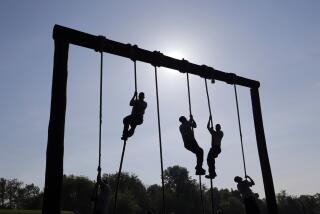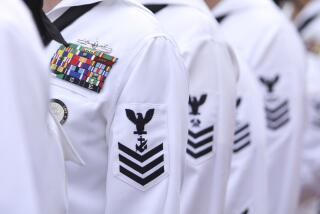Navy Symposium Aims to Improve Life on the Bounding Main
- Share via
The Navy held a national symposium Thursday in Mission Valley on improving the quality of life aboard ships and on bases. And American businessmen were right there, showing the Navy how to do it.
While somewhat esoteric seminars with naval engineers and private contractors discussed the likes of how to build better uniform lockers, salesmen in an exhibit hall were pitching to Navy buyers all sorts of gizmos and gadgets and the latest decorator styles in barrack and shipboard bed and desk sets.
In fact, the bottom level of the Town & Country Hotel Convention Center looked like a cross between a furniture showroom and a county fair housewares exhibit hall.
Hey, Navy, step right up!
What mess cook wouldn’t want his supply officer to buy him the Egg King? In 60 seconds, it will crack, extract and scramble 360 eggs and you can’t find a single piece of shell in the output bucket. Salesman Aaron Komen says he already has sold the military a bunch of the $3,400 machines, which will save goodness knows how many egg-cracking-and-scambling man-hours and a whole bunch of money in the long run.
What skipper of an aircraft carrier wouldn’t like to throw his men a flight-deck barbecue? John Swisher will sell you one of his five-foot-long Big John grills and rotisseries to roast just that perfect pig at sea. Nosiree, no more 55-gallon drums cut in half for those barbecues.
If your ship deck can’t handle a grill, then check out Maurie Lee’s pressurized Smokaroma, which will cook 45 pounds of pork ribs in less than an hour and a half, producing tasty, tender and tangy barbecue belowdecks without even a whiff of smoke.
Food sales rep Laurie Pycz was offering free samples of breaded shrimp and gourmet cod nuggets because, after all, don’t seafood and the Navy go together?
Or there was Instant Burger, which uses direct energy transfer to cook two eight-ounce hamburgers in 25 seconds.
Del Foley was offering sample glasses of margaritas and pina coladas, dispensed from frozen cocktail machines that will keep them happy in any officer’s club. For shipboard use, try the alcohol-free slushy daiquiris.
David Ford wants the Navy to buy his Johnston’s frozen ice cream sundaes which you pop in the microwave to heat up the hot fudge without melting the ice cream.
There was more than just food: salesmen were showing off state-of-the-art industrial trash compactors (the Navy doesn’t want any more garbage floating on the water, Michael Francis pitched) and washer/extractors capable of washing 200 pounds of clothes at a time with a minimum of water usage. There were bike lockers so sailors could keep their bicycles safe on base. There were decorative color prints to spruce up any junior officer’s stateroom, and the husband-and-wife team of Jack and Susie Lewis were selling their Make Be-Leaves silk plants and trees to give the illusion of jungle life to a submarine.
And everywhere, there were barrack bed sets, admiral suites and ship bunks on display. John Weaver was showing off a bunk-bed ensemble with matching wall units; not only was the poplar wood construction more stylish and rustic than, say, steel, but it would hold up well “and if it does get a little beat up, it’ll just look that much more rustic.”
Down the aisle, Frank Fogleman was extolling the virtues of his bed-and-desk sets with indirect accent lights.
Accent lights? The Navy ain’t like it use to be, old salts mused--but then, you’ve got to keep today’s sailors happy.
Indeed, the symposium--which is held every two years at different sites around the country--is intended to air complaints about the quality of life in the Navy and see if something can be done about it.
Cmdr. Bob Pinnell, stationed at North Island as the quality control officer for the 80,000-plus men of the Naval Air Force Pacific Fleet, said some men’s complaints about Navy life never change.
“Everyone wants more space and better food, and some things you can never solve,” he said. “Room aboard ship is a bigger problem than ever. It used to be you’d have 12 airplanes with five electrical technicians and now we need 50 electrical people for four airplanes. On top of that, there’s a higher proportion of officers, and they need more space because we try to give them a higher standard of living.”
These symposiums “give Seaman Jones the chance to make suggestions directly to vice admirals” without having to cut through layers of bureaucracy, Pinnell said. And many suggestions are acted upon.
It was because of suggestions at previous biannual symposiums, for instance, that ships’ cooks began offering fast food, video games were brought aboard ships for recreation and color schemes were shifted from gray to earth tones.
Among some of Thursday’s complaints aired to the brass:
- Aircraft carrier chapels and chaplain’s offices should be moved from their current noisy locations--one level below the flight deck catapults--to quieter spots, given the nature of a cleric’s work.
- Sturdier--and wider--lockers are needed on ships, with more reliable and quick-to-use locks to better and more conveniently safeguard personal possessions.
- While the Armed Forces Radio and Television System provides taped television programming for viewing aboard ships, live satellite feeds should be offered--not only of commercial networks but especially with such private services as HBO and the Playboy Channel.
To that issue, Senior Chief Petty Officer Chris Bell told his audience that experiments have been conducted to determine whether television satellite dishes can function on ships at sea. The first series of tests--aboard the aircraft carrier Ranger--failed.
“In order to receive the signal, we had to shut down all our comm (communications) gear,” he said. “And that was unacceptable.”
The Navy, he said, is working on the problem.


